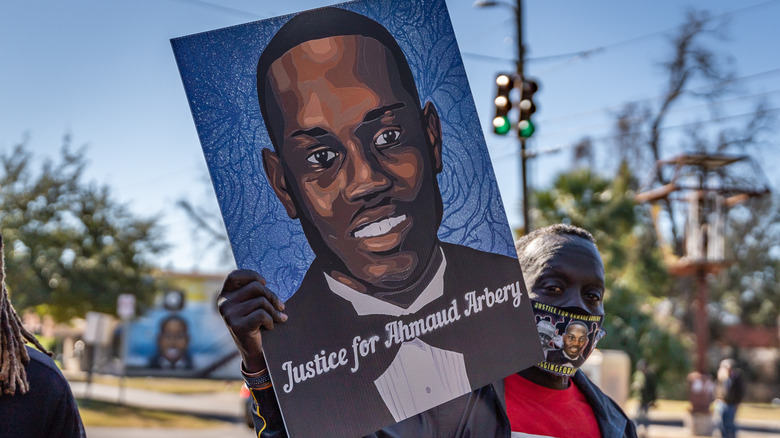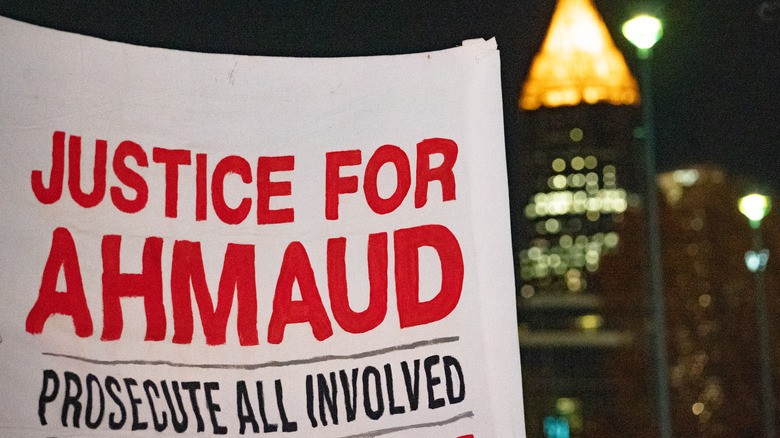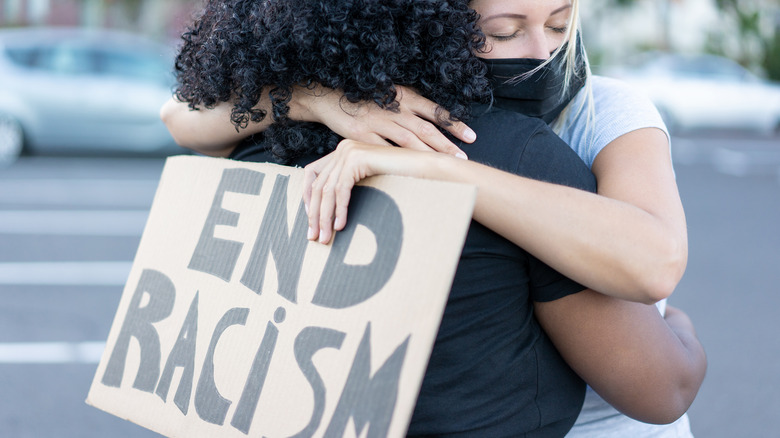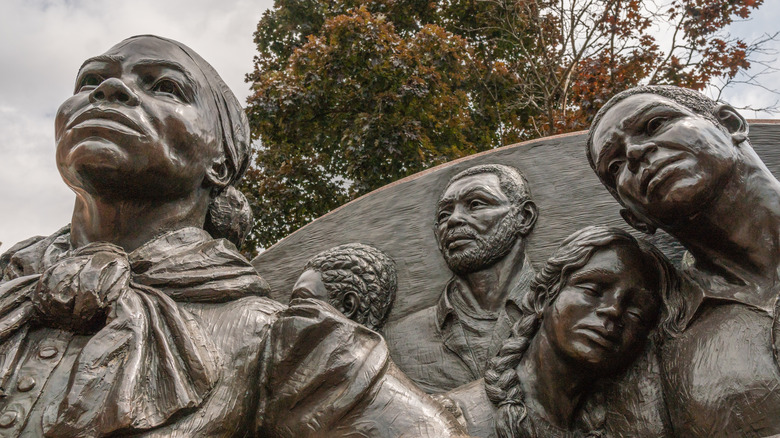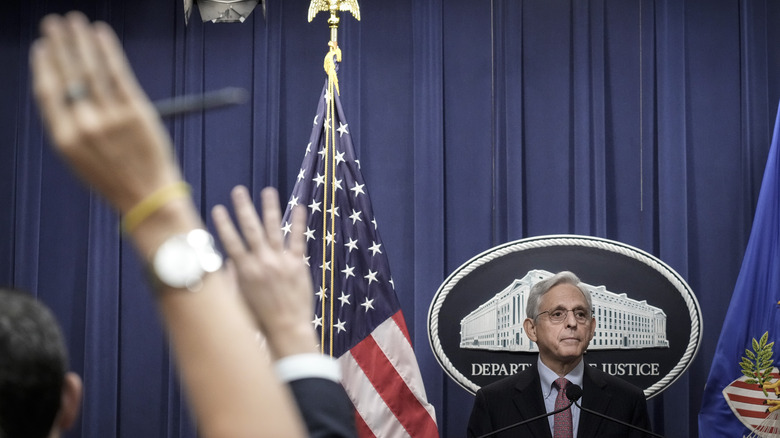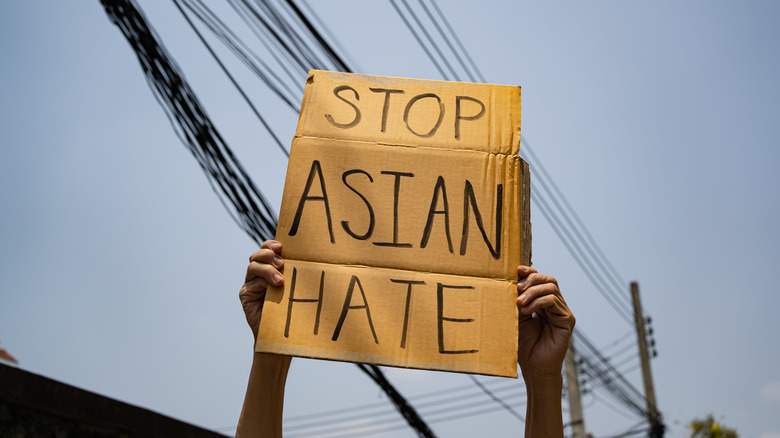The Federal Sentencing For Ahmaud Arbery's Murderers Explained
Hate crimes happen with alarming regularity in the United States. As Newsweek explains, the Donald Trump presidency saw a staggering 20% increase in hate crimes, which was the highest it had been in a period of 28 years. The vast majority of hate crimes were committed by white supremacists. And as in many other hate crimes, Ahmaud Arbery was yet another victim in the long line of marginalized murder.
Arbery, an African American man, was killed on February 23, 2020, by Gregory and Travis McMichael, a white father and son, and William Bryan. The act was determined to be a federal hate crime by the court, which gave the McMichaels life sentences, and a 35-year sentence for Bryan. As CNN reports, Arbery's family pushed for the maximum sentence for each of the men responsible. The three killers were found guilty on federal charges in February — interference with rights, classified as a hate crime, as well as other charges — after the court found evidence of racial motivation. They had previously been convicted of murder in state court, according to The New York Times.
Who was Ahmaud Arbery?
Arbery's tragic death mirrored that of George Floyd's back in 2020. Both men had been killed and video of both crimes were recorded by the public, leading to a victorious verdict in court, and some relief for the families involved.
Arbery was born on May 8, 1994 and lived in the predominantly Black neighborhood of Fancy Bluff in Georgia. As reported by NPR, Abery was a linebacker in high school, but was set to study at South Georgia Technical College to be an electrician.
Friends and family described him as a kind-hearted person. According to ABC News, Arbery also worked at various jobs to make ends meet, such as the car wash business, McDonald's, and landscaping. His goals in life were to make it big in the NFL one day, but his small stature was an obstacle to accomplishing that. And though Arbery had also committed some petty crimes, including shoplifting, he showed signs of getting himself back on the right track before his life was tragically cut short.
The racial motivations behind the killers
The killing of Arbery was deemed to be a federal hate crime. In general, hate-crime laws can vary from state to state, with three states — Wyoming, Arkansas, and South Carolina — not even having hate-crime laws at all, as reported by KSLA News 12.
Arbery's killers chased, shot and killed him on the basis of racial profiling. They assumed he was a thief in the area, which gave them license to trail him. As The New York Times reports, Arbery was chased for five minutes by the killers, which eventually ended with him being shot and killed with three shots from a 12-gauge shotgun.
According to CNN, the murderers said they were trying to make a citizen's arrest, as they assumed he was going to commit a robbery or had already done so. Gregory McMichael's alleged reasoning for this was that the area had already experienced a plethora of robberies before the shooting. However, this was disproven by Glynn County police, who said that only one robbery had happened within the weeks prior. Given that there reportedly wasn't any evidence to suspect Arbery of crime, the motivation boils down to profiling, as Arbery was in the area jogging at the time.
A slavery era law was used as a defense
Like many southern states in America, Georgia had a part in slavery and the Civil War that followed. As Britannica says, the agriculture in Georgia depended on slavery for much of its economic growth. The state had numerous plantations. Georgia was also indispensable in the creation of the Confederate States of America and had pushed for secession and the Civil War with full speed. And though slavery and the war eventually ended, the ghosts of both still linger on in the heart of Georgia itself.
One such legacy that continued on was a Georgia law from slavery days that enabled common civilians to make what is called a citizen's arrest on grounds of any suspicion. As Reuters says, the law was used as defense during the trial, citing that the killers had a right to do what they did, given sufficient suspicion. The law gained media attention during the trial, leading many to call the law racist, as it disproportionately affects non-white people.
How the Department of Justice defines hate crimes
In general, many hate crimes either do not make it to court or do not get prosecuted. This is because hate crime laws in general tend to be murky in definition, as the legal systems do not operate for the benefit of marginalized people. As ABC News says, hate crimes need very solid evidence of bigoted motivation. This often means that court systems have discretion in how hate crimes are investigated and prosecuted, leading to various interpretations of hate-crime laws. There's also a lack of resources and attention given to these investigations, leading to many buried cases.
The U.S. Department of Justice has an outline for what constitutes a hate crime. According to the DOJ website, a hate crime is defined as any violent crime committed or planned with the full intent of discriminating against someone's identity and/or background, such as gender, race, religion, color, disability, and more. Hate-crime laws help enshrine these protections, even if they may not always be exercised. Luckily, the state of Georgia is now acknowledging such incidents of crime and will use them for future prosecutions.
Arbery's death changed Georgia's stance on hate-crime laws
As the trial progressed and media attention stayed focused on the Arbery killing, harrowing details about Georgia's law system soon came to light. As reported by The New York Times, Georgia was one of the states that did not have a hate-crime statue in effect. This meant that it was very difficult to get incidents of hate-crimes prosecuted as such in court. However, that changed a year after Arbery was killed. Georgia state politicians passed a hate-crimes law in 2021, which might help prosecute incidents of racially motivated murder, such as the Atlanta massage parlor shootings in March 2021 that targeted Asian people.
Because of Georgia's new implementation of these laws, some ongoing investigations and trials could also be affected by them. As the AP News reports, the Georgian spa shootings might get a much-needed boost to reach proper justice in the verdict. It is unclear whether this will help future cases, as hate crimes in general tend to be difficult to prosecute, but there's no doubt that this is a right step forward.
